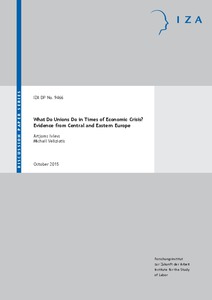What do unions do in times of economic crisis? Evidence from Central and Eastern Europe
"Over the last two decades, trade union membership in Central and Eastern Europe has been in continuous decline and there is a common perception that trade unions in the region are weak. However, little is known about the actual relevance of trade unions for individual workers in the post-socia...
| Main Authors: | , |
|---|---|
| Institution: | ETUI-European Trade Union Institute |
| Format: | TEXT |
| Language: | English |
| Published: |
Bonn
2015
IZA |
| Subjects: | |
| Online Access: | https://www.labourline.org/KENTIKA-19109986124919271689-What-do-unions-do-in-times-of-.htm |
| Summary: | "Over the last two decades, trade union membership in Central and Eastern Europe has been in continuous decline and there is a common perception that trade unions in the region are weak. However, little is known about the actual relevance of trade unions for individual workers in the post-socialist world. We explore the role that trade unions played in protecting their members from the negative effects of the global economic crisis. Using data for twenty one post-socialist countries from the Life in Transition-2 survey, we find that trade union members were less likely than similar non-members to lose their jobs during the crisis. This beneficial effect of trade union membership was more pronounced in countries which were hit by the crisis harder. At the same time, union members were more likely to experience a wage reduction, suggesting that unions were engaged in concession bargaining. Overall, our results challenge the common view that trade unions in the post-socialist countries are weak and irrelevant." |
|---|---|
| Physical Description: | 22 p. Digital |

